- Home
- Ian Mcewan
Sweet Tooth Page 5
Sweet Tooth Read online
Page 5
I returned to my bedsit that afternoon, gave notice to my landlord and began to pack up my room. The following day I arrived home in the cathedral close with all my belongings. My mother was delighted for me and embraced me lovingly. To my astonishment, the Bishop gave me a twenty-pound note. Three weeks later I started my new life in London.
Did I know Millie Trimingham, the single mother who would one day become Director General? When, in later years, it became permissible to tell everyone that you once worked for MI5, I was often asked this question. If it irritated me it was because I suspected it concealed another: with my Cambridge connections why didn’t I rise nearly as high? I joined three years after she did, and, it’s true, I started out following her path, the one she describes in her memoir – same grim building in Mayfair, same training section in a long, thin, ill-lit room, same tasks, both meaningless and intriguing. But when I joined in 1972 Trimingham was already a legend among the new girls. Remember, we were in our early twenties, she was in her mid-thirties. My new friend Shirley Shilling pointed her out to me. Trimingham was at the end of a corridor, back-lit by a grubby window, a wedge of files under one arm, in urgent conference with an anonymous man who looked to be from the cloudy summits of authority. She seemed at ease, almost an equal, clearly empowered to make a joke, causing him to give out a shout of a laugh and place his hand on her forearm briefly, as if to say, restrain that wit of yours or you’ll make my life impossible.
She was admired by us new-joiners because we’d heard that she’d mastered the filing system and the intricacies of the Registry so quickly that she was moved on in less than two months. Some said it was weeks, even days. We believed there was a hint of rebellion in the clothes she wore, bright prints and scarves, authentic, bought in Pakistan, where she’d worked for the Service in some lawless outpost. This was what we told ourselves. We should have asked her. A lifetime later I read in her memoir that she did clerical work in the Islamabad office. I still don’t know if she took part in the Women’s Revolt of that year, when female graduates in MI5 started campaigning for better prospects. They wanted to be allowed to run agents themselves, like male desk officers. My guess is that Trimingham would have been sympathetic to the aims, but wary of collective action, speeches and resolutions. I’ve never understood why word of the Revolt never reached our intake. Perhaps we were considered too junior. Above all, it was the spirit of the age that slowly changed the Service, but she was the first to break out, first to dig the hole in the ceiling of the women’s block. She did it quietly, with tact. The rest of us scrambled up noisily behind her. I was one of the last. And when she had been transferred out of the training section, it was to confront the hard new future – IRA terrorism – whereas many of us who followed lingered a while, fighting the old battles with the Soviet Union.
Most of the ground floor was taken up by the Registry, that vast memory bank where more than three hundred wellborn secretaries toiled like slaves on the pyramids, processing file requests, returning or distributing files to desk case officers round the building and sorting incoming material. The system was thought to work so well that it held out far too long against the computer age. This was the last redoubt, the ultimate tyranny of paper. Just as an army recruit is made to embrace his new life by peeling spuds and scouring the parade ground with a toothbrush, so I passed my first few months compiling members’ lists of provincial branches of the Communist Party of Great Britain and opening files on all those not already accounted for. My special concern was Gloucestershire. (In her time, Trimingham had Yorkshire.) In my first month I opened a file on the headmaster of a grammar school in Stroud who had attended an open meeting of his local branch one Saturday evening in July 1972. He wrote his name on a sheet of paper that was circulated by the comrades, but then he must have decided not to join. He was on none of the subscription lists that had been procured for us. But I chose to start a file on him because he was in a position to influence young minds. This was on my own initiative, my very first, and that’s why I remember his name, Harold Templeman, and his year of birth. If Templeman had decided to get out of schoolmastering (he was only forty-three) and apply for a Civil Service job that brought him into contact with classified information, the vetting procedure would have led someone to his file. Templeman would have been questioned about that evening in July (surely he would have been impressed) or his application would have been dismissed and he would never have known why. Perfect. In theory, at least. We were still learning the demanding protocols that determined what was acceptable material for a file. During the early months of 1973 such a closed, functioning system, however pointless, was a comfort to me. All twelve of us working in that room knew well enough that any agent run by the Soviet Centre was never going to announce himself to us by joining the Communist Party of Great Britain. I didn’t care.
On my way to work I used to reflect on the immensity that separated my job description from the reality. I could say to myself – since I could say it to no one else – that I worked for MI5. That had a certain ring. Even now it stirs me a little, to think of that pale little thing wanting to do her bit for the country. But I was just one more office girl in a mini-skirt, jammed in with the rest, thousands of us pouring down the filthy connecting Tube tunnels at the change for Green Park, where the litter and grit and stinking subterranean gales that we took as our due slapped our faces and restyled our hair. (London is so much cleaner now.) And when I got to work, I was still an office girl, typing straight-backed on a giant Remington in a smoky room like hundreds of thousands across the capital, fetching files, deciphering male handwriting, hurrying back from my lunch break. I even earned less than most. And just like the working girl in a Betjeman poem Tony once read to me, I too washed my smalls in the hand basin of my bedsit.
As a clerical officer of the lowest grade my first week’s pay after deductions was fourteen pounds thirty pence, in the novel decimal currency, which had not yet lost its unserious, half-baked, fraudulent air. I paid four pounds a week for my room, and an extra pound for electricity. My travel cost just over a pound, leaving me eight pounds for food and all else. I present these details not to complain, but in the spirit of Jane Austen, whose novels I had once raced through at Cambridge. How can one understand the inner life of a character, real or fictional, without knowing the state of her finances? Miss Frome, newly installed in diminutive lodgings at number seventy St Augustine’s Road, London North West One, had less than one thousand a year and a heavy heart. I managed week to week, but I did not feel part of a glamorous clandestine world.
Still, I was young, and maintaining a heavy heart all moments of the day was beyond me. My chum, at lunch breaks and evenings out, was Shirley Shilling, whose alliterative name in the dependable old currency caught something of her plump lop-sided smile and old-fashioned taste for fun. She was in trouble with our chain-smoking supervisor, Miss Ling, in the very first week for ‘taking too long in the lavatory’. Actually, Shirley had hurried out of the building at ten o’clock to buy herself a frock for a party that night, had run all the way to Marks & Spencer in Oxford Street, found the very thing, tried it on, tried the next size up, paid and got a bus back – in twenty minutes. There would have been no time at lunch because she planned to try on shoes. None of the rest of us new girls would have dared so much.
So what did we make of her? The cultural changes of the past several years may have seemed profound but they had clipped no one’s social antennae. Within a minute, no, less, by the time Shirley had uttered three words, we would have known that she was of humble origins. Her father owned a bed and sofa shop in Ilford called Bedworld, her school was a giant local comprehensive, her university was Nottingham. She was the first in her family to stay on at school past the age of sixteen. MI5 may have been wanting to demonstrate a more open recruitment policy, but Shirley happened to be exceptional. She typed at twice the speed of the best of us, her memory – for faces, files, conversations, procedures – was sharper than ours, s
he asked fearless, interesting questions. It was a sign of the times that a large minority of the girls admired her – her mild Cockney had a touch of modern glamour, her voice and manner reminded us of Twiggy or Keith Richards or Bobby Moore. In fact her brother was a professional footballer who played for the Wolverhampton Wanderers reserves. This club, so we were obliged to learn, had reached the final of the new-fangled UEFA Cup that year. Shirley was exotic, she represented a confident new world.
Some girls were snobbish about Shirley, but none of us was as worldly and cool. Many of our intake would have been presentable at court to Queen Elizabeth as debutantes if the practice hadn’t been terminated fifteen years earlier. A few were the daughters or nieces of serving or retired officers. Two-thirds of us had degrees from the older universities. We spoke in identical tones, we were socially confident and could have passed muster at a country house weekend. But there was always a trace of an apology in our style, a polite impulse to defer, especially when one of the senior officers, one of the ex-colonial types, came through our crepuscular room. Then most of us (I exclude myself, of course) were the mistresses of the lowered gaze and the compliant near-smile. Among the new-joiners a low-level unacknowledged search was on for a decent husband from the right sort of background.
Shirley, however, was unapologetically loud and, being in no mood to marry, looked everyone in the eye. She had a knack or weakness for laughing boisterously at her own anecdotes – not, I thought, because she found herself funny, but because she thought that life needed celebrating and wanted others to join in. Loud people, especially loud women, always attract enemies and Shirley had one or two who despised her heartily, but in general she breezed her way into our affections, mine especially. It may have helped her, not to have been threateningly beautiful. She was large, at least thirty pounds overweight, size sixteen to my ten, and she actually told us that the word we must use of her was ‘willowy’. Then she laughed. Her round, somewhat pudgy face was rescued, even blessed, by being rarely at rest, she was so animated. Her best feature was the slightly unusual combination of black hair, naturally curled, with pale freckles across the bridge of her nose, and greyish-blue eyes. And her smile tilted downwards to the right, giving her a look I can’t quite find the word for. Somewhere between rakish and game. Despite her limited circumstances, she had been around more than most of us. In the year after university she hitchhiked alone to Istanbul, sold her blood, bought a motorbike, broke her leg, shoulder and elbow, fell in love with a Syrian doctor, had an abortion, and was brought home to England from Anatolia on a private yacht in return for a little on-board cooking.
But from my point of view none of these adventures was as exotic as the notebook she carried with her always, a childish pink plastic-covered thing with a short pencil tucked into the spine. For a while she wouldn’t say what she wrote, but one evening in a Muswell Hill pub she owned up to jotting down ‘the clever or funny or daft stuff’ people said. She also wrote ‘tiny stories about stories’ and otherwise just ‘thoughts’. The notebook was always within reach and she’d write in it mid-conversation. The other girls in the office teased her about it, and I was curious to know if she had wider writing ambitions. I talked to her about the books I was reading, and though she listened politely, even intently, she never offered an opinion of her own. I wasn’t sure she did any reading at all. Either that or she was protecting a big secret.
She lodged just a mile to the north of me in a tiny third-floor room that overlooked the thunderous Holloway Road. Within a week of introducing ourselves we started meeting in the evenings. Soon afterwards I discovered that our friendship had earned us the office nickname ‘Laurel and Hardy’, the reference being to our relative sizes, not a taste for slapstick. I didn’t tell Shirley. It never occurred to her that a night out should take place anywhere other than in pubs, by preference noisy ones with music. She had no interest in the places round Mayfair. Within a few months I was familiar with the human ecology, the gradations of decency and decay, of the pubs around Camden, Kentish Town and Islington.
It was in Kentish Town, on our first excursion, that I saw in an Irish pub a terrible fight. In films a punch to the jaw is banal but it’s extraordinary to witness in reality, though the sound, the bony crunch, is far more muted and wet. To a sheltered young woman, it looked reckless beyond belief, so careless of retaliation, of prospects, of life itself, those fists that wielded a pick-axe by day for Murphy the builders, pile-driving into a face. We watched from our bar stools. I saw something curve through the air past a beer-pump handle – a button or a tooth. More people were joining in, there was a fair amount of shouting, and the barman, a handy-looking fellow himself with a caduceus tattooed above his wrist, was speaking into the phone. Shirley put an arm about my shoulders and propelled me towards the door. Our rum and cokes with melting ice were behind us on the bar.
‘Police on their way, might want witnesses. Best to go.’ Out in the street we remembered her coat. ‘Ah forget it,’ she said with a wave of her hand. She was already walking on. ‘I ’ate that coat.’
We weren’t looking for men on our nights out. Instead, we talked a good deal – about our families, about our lives so far. She spoke of her Syrian doctor, I spoke of Jeremy Mott, but not of Tony Canning. Office gossip was strictly forbidden, even to us lowly beginners, and it was a matter of pride to obey instructions. Besides, I had the impression that Shirley was already doing more important work than me. It was bad form to ask. When our pub conversation was interrupted, when men did approach us, they came looking for me and got Shirley instead. I was content to be mute at her side as she took over. They couldn’t get past the banter and laughter, the bright chatty questions about what they did and where they were from, and they retreated after subsidising a round or two of rum and cokes. In the hippy pubs around Camden Lock, which was not yet a tourist attraction, the long-haired men were more insidious and persistent with softer come-ons about their inner feminine spirit, the collective unconscious, the transit of Venus and related hokum. Shirley repelled them with uncomprehending friendliness while I shrank from these reminders of my sister.
We would be in that part of town for the music, drinking our way towards the Dublin Castle on Parkway. Shirley had a boyish passion for rock and roll and in the early seventies the best bands played in pubs, often cavernous Victorian establishments. I surprised myself by developing a passing taste for this racy, unpretentious music. My bedsit was dull and I was glad to have something to do in the evenings apart from reading novels. One evening, when we knew each other better, Shirley and I had a conversation about our ideal man. She told me about her dream, an introspective bony guy, just over six feet, jeans, black T-shirt, cropped hair and hollow cheeks and a guitar round his neck. We must have seen two dozen versions of this archetype as she escorted me to all pub venues between Canvey Island and Shepherd’s Bush. We heard Bees Make Honey (my favourite), Roogalator (hers) – and Dr Feelgood, Ducks Deluxe, Kilburn and the High Roads. Not like me at all, to be standing in a sweaty crowd with a half pint in my hand, my ears buzzing with the din. It gave me some innocent pleasure to think how horrified the counter-culture crowd around us would be, to know that we were the ultimate enemy from the ‘straight’ grey world of MI5. Laurel and Hardy, the new shock troops of internal security.
4
Towards the end of winter in 1973 I received a letter forwarded by my mother from my old friend Jeremy Mott. He was still in Edinburgh, still happy with his doctoral work and his new life of semi-secretive affairs, each one ending, so he claimed, without much trouble or remorse. I read the letter one morning on my way to work on one of the rare occasions when I’d managed to push through the packed fetid carriage and find myself a seat. The important paragraph began halfway down the second page. To Jeremy it would have been no more than an item of serious gossip.
You remember my tutor, Tony Canning. We went to his rooms once for tea. Last September he left his wife, Frieda. They were married for more than
thirty years. No explanation apparently. There’d been rumours around the college that he’d been seeing a younger woman out at his cottage in Suffolk. But that wasn’t it. The word was he dumped her too. I had a letter from a friend last month. He heard it from the Master’s mouth. All this has been an open secret around the college but no one thought to tell me. Canning was ill. Why not say it? He had something badly wrong and he was beyond treatment. In October he resigned his fellowship and took himself off to an island in the Baltic, where he rented a small house. He was looked after by a local woman, who may have been a little more than a housekeeper. Towards the end he was moved to a cottage hospital on another island. His son visited him there and Frieda went too. I’m assuming you didn’t see the obituary in The Times in February. I’m sure I would have heard from you if you had. I never knew he was in the SOE towards the end of the war. Quite the hero, parachuting into Bulgaria by night and getting seriously wounded in the chest during an ambush. Then four years in MI5 in the late forties. Our fathers’ generation – their lives were so much more meaningful than ours, don’t you think? Tony was awfully good to me. I wish someone had let me know. At least I could have written to him. Why don’t you come and cheer me up? There’s a sweet little spare room off the kitchen. But I think I’ve told you that before.
Why not say it? Cancer. In the early seventies it was only just coming to an end, the time when people used to drop their voices at the word. Cancer was a disgrace, the victim’s that is, a form of failure, a smear and a dirty defect, of personality rather than flesh. Back then I’m sure I’d have taken for granted Tony’s need to creep away without explanation, to winter with his awful secret by a cold sea. The sand dunes of his childhood, bitter winds, treeless inland marshes, and Tony walking by the empty beach hunched in his donkey jacket with his shame, his nasty secret and his increasing need for another nap. Sleep coming in like a tide. Of course he needed to be alone. I’m sure I didn’t question any of that. What impressed and shocked me was the planning. Telling me to put my blouse in the laundry basket, then pretending to forget that he had in order to make himself obnoxious to me so I wouldn’t follow him and complicate his last months. Did it really have to be so elaborate? Or severe?

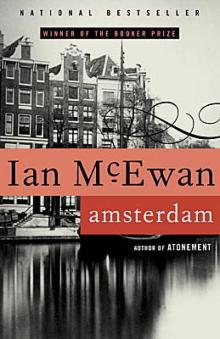 Amsterdam
Amsterdam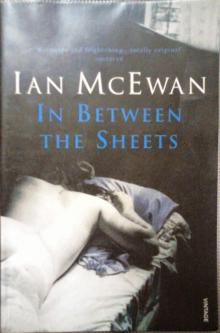 In Between the Sheets
In Between the Sheets Atonement
Atonement My Purple Scented Novel
My Purple Scented Novel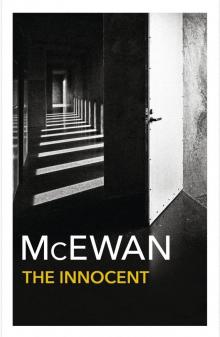 The Innocent
The Innocent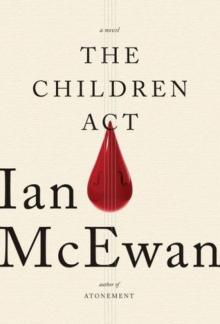 The Children Act
The Children Act Enduring Love
Enduring Love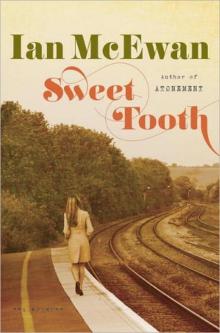 Sweet Tooth
Sweet Tooth On Chesil Beach
On Chesil Beach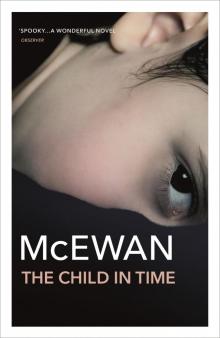 The Child in Time
The Child in Time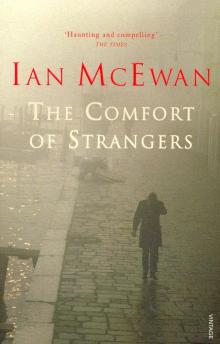 The Comfort of Strangers
The Comfort of Strangers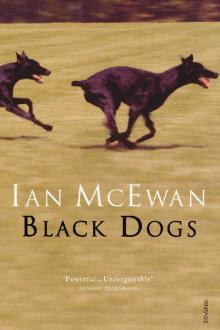 Black Dogs
Black Dogs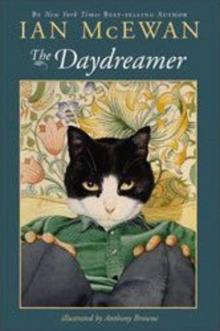 The Daydreamer
The Daydreamer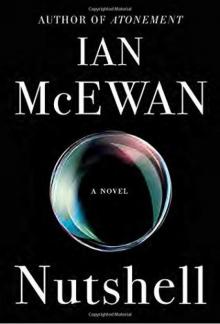 Nutshell
Nutshell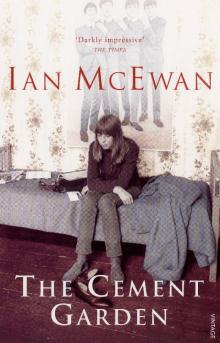 The Cement Garden
The Cement Garden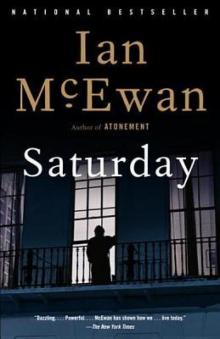 Saturday
Saturday Machines Like Me
Machines Like Me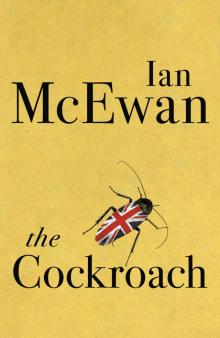 The Cockroach
The Cockroach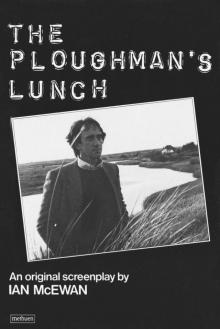 The Ploughman’s Lunch
The Ploughman’s Lunch